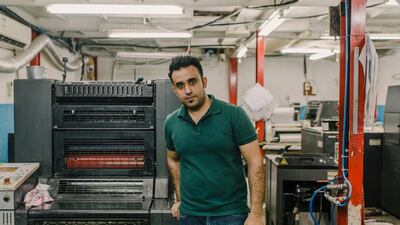Mughees Khan began building a car four years ago to represent the American University of Sharjah (AUS) for a fuel-efficient race which has since spilled over into his family’s business.
The Khan family owns the Al Fayadh Printing Press in Sharjah. It began as a simple printing company in 1999 and expanded into packaging mainly perfumes covering the GCC market.
The global fragrance and perfume industry is large, and is expected to reach US$51.3 billion in five years, according to Global Industry Analysts. The Middle East and Asia-Pacific are the two fastest growing markets.
And the Sharjah-based business is looking to offer new packaging solutions for the perfume industry to help meet the rise in demand.
Mr Khan, 27, graduated from AUS two years ago and is now the business development director for the company. “After the Shell Eco-marathon, it made me think that we needed to consider the environment,” he said.
The event, which takes place on three continents, challenges students from around the world to build a car from scratch that can drive on the least amount of fuel. Mr Khan was the AUS team leader that helped build the car that competed in the race in Manila in 2015.
The team had a US$10,000 budget, but tried to save as much as possible to put the remainder towards travel expenses.
“Everyone was using carbon fibre or fibreglass for the body of the car, but I had some knowledge about the packaging materials,” he said. “So the entire body of the car was made with recycled paper – it was a big breakthrough for us.”
It played a major part in the team using only $5,000 to create its prototype. And it inspired Mr Khan to add recycled paper to the company’s offerings.
“Not many people are offering recycled products,” he said, adding that it is even seen as a marketing tool with about 20 per cent of customers requesting recycled materials.
Mr Khan has also leveraged other lessons learnt from that university project.
“A lot of waste comes out of our factory,” he said. Now Al Fayadh sells its waste to other nearby companies, such as styrofoam cutouts to another factory that can repurpose the material. In addition, rubbish is sold to a waste management company for about Dh3,000 per month.
“Before we gave it to a third party, but now we deal directly with the Sharjah Government through waste management company Bee’ah. They take all the waste and utilise it.”
He says that there is still room for growth as the company has to import 100 per cent recycled paper as the UAE currently only sells a blend typically 60 to 70 per cent. “Someone needs to make a big investment in the UAE to bring this to the market as well as bringing the same type of quality,” he said.
For now the company is trying to grow its clients’ interest in the recyclable option while repurposing factory waste. This not only benefits the environment, but also saves the company thousands of dirhams each month, and it is all thanks to one race.
lgraves@thenational.ae
Follow The National's Business section on Twitter

